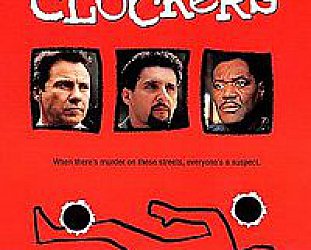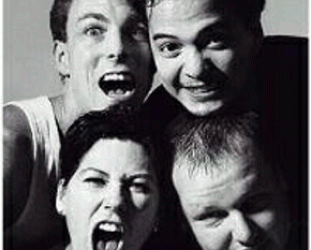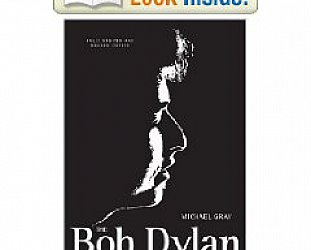Graham Reid | | 9 min read

The various encyclopaedias of rock don’t do justice to Warren Zevon. He got a snippy microscopic reference in the 91 New Illustrated Rock Handbook (“well-established but usually hitless”) and a massive tome from the same period by Phil Hardy and Stephen Barnard didn’t mention him at all.
A few others get to the usual stuff. That he played piano for the Everly Brothers, wrote a few jingles, penned Poor Poor Pitiful Me and Hasten Down the Wind which Linda Ronstadt turned into hits in the mid-70s, was part of that Eagles/Jackson Browne LA clique and scored his own one-off hit with Werewolves of London . . .
Then things got kinda thin.
A few album titles down the subsequent years and the occasional quick quote to round out his career. Usually something about the lyrics.
Include the words “psyche” and “disturbing” and you’ve probably got “Warren Zevon (b Chicago 24 Jan ’47)” down into a few neat paragraphs. Time to move on to the Zombies...
But that doesn’t quite explain a song like Excitable Boy, about a guy who rubbed pot roast on his chest, sank his teeth into the leg of an usherette, raped and murdered a girl at the junior prom, then built a cage with her bones.
Nor does it allow for years of alcohol addiction (seven in all, the result of stage fright), his reputation for erratic and dangerous behaviour (put him at the top of stairs and he’d dive off to see how it felt was the usual story) or for the boy who loved Stravinsky growing into the man who would pen those classic, desperate lines “send lawyers, guns and money, Dad, the shit has hit the fan.”
You suspected Zevon wasn’t in the rock encyclopaedias simply because he didn’t quite fit. And he still doesn’t.
Like Gary Larson’s Far Side cartoons, Zevon’s songs offer skew-headed humour with an undercurrent of disturbing distortions of reality. Preconceptions are inverted and the clown has a dark heart.
Age doesn’t seem to have mellowed him much as this “unapologetically harsh, nasty, ironic and really rather terrific” singer-songwriter (Time, late 91) still spins out a weird lyric. Try this from his album, Mr Bad Example, the song Model Citizen: “torment the mailman, terrorise the maid, try to teach ‘em manners, whip ‘em into shape...down in the basement I’ve got a Craftsman lathe, show it to the children when they misbehave.”
Chilly, Warren, chilly.
Yet in his apartment in West Hollywood he sounds just fine, thank you.
The dark, deep voice is measured and precise, the long pauses between phrases appropriately disconcerting and the humour with a sardonic edge is intact. And he’s got plenty of time to talk.
“Yeah, we gots lotsa of time,” he laughs.
It would be convenient to report that Zevon’s career has just received a kickstart, that maybe old friend Springsteen has recorded an album of Zevon songs or that Mr Bad Example has finally gone top 10 in the States.
Not so.
He’s a cult act, he acknowledges, and admits disappointment that neither Mr Bad Example nor its predecessor - the bleak, rocking, conceptual Transverse City - was a big seller and that these days he hardly sees any of the old LA mafia such as David Lindley, Linda Ronstadt, or the Eagles.
But he is touring a much acclaimed solo show and thoroughly enjoying the freedom it offers.
“The show has developed into something longer than I originally intended and now it’s a whole evening thing, the full two hours. I refer to it as my Miss Saigon.
“You know, there’s a complete helicopter on stage – the whole bit. It’s now not quite the modest recital I billed it as.
“I’m enjoying it and I remarked to a friend of mine recently that I like being an entertainer, meaning I like the part where, if the sound breaks down, it’s incumbent on me to make a few jokes and see that the ship doesn’t sink.”
Not short of a wry quip, Zevon says he hopes there are not sound problems because every concert on his solo tour is being recorded for a live album. His apartment is “knee-deep in DATs” and already his record company is talking about making the album a double CD.
“If we record every show, I figured, I’d eventually stop being self-conscious about the fact we’re recording. Now you say, ‘has it worked?’ and I say ‘No!’.
“The standing joke I’ve made in the States is the last time I did a live album it was an election year, so it’s perhaps that lust for personal advancement in the air that I smell.
“But, if nothing else, it’s proven to be an enjoyable way of seeing the country here...although I tend to only go to places with an airport. I’m sure there’s still another America out there.”
Whatever America might be out there, it isn’t one that Zevon sees now – or has ever seen. These days he says he doesn’t venture far from home. “I walk to the corner for Turkish coffee, the other for breakfast, walk to the bookstore or movies – although it’s Hollywood, it’s just like a neighbourhood.”
And growing up in the city of the angels, his vision was most often distorted or skewed, initially by dislocation and then by the fashionable but crippling LA addictions in the 70s. Toss in a sharp mind and a gift for lyric writing and you’ve got the man who penned songs with titles such as Roland the Headless Thompson Gunner, I’ll Sleep When I’m Dead and Desperadoes Under the Eaves.
And he’s still at it. The grim futuristic visions of Transverse City come wrapped up in songs about living in Splendid Isolation, the gridlock on the highways of LA and a world pumped full of fluorocarbons, the clergy of the mall” and “nobody move nobody get hurt.”
In Zevon’s lyrics – frequently wrapped in additive melodies and played with the help of friends such as Neil Young and ex-Jefferson Airplane members – the ugly is the norm and insanity the only reasonable response to the violence which lies just below the scar tissue.
Back in ’81 when he toured Britain, he attributed the quality of his work (“idiosyncratic or whatever you want to call it”) to not having any particular song writing technique and no control over what came out.
“I certainly can’t craft within a style,” he says today, “and they are still very spontaneous. But over time, work habits improve, so it’s now not all just waiting for five years and the next inspiration.
“I wrote several songs in a few months for this tour, which mostly includes something from all periods. I do new songs and old songs back to back if they seem to refer to each other.
“I recently wrote a keyboard song to play and a slide guitar thing because I met my hero John Hammond and decided I wanted to learn to play slide...but I don’t see that some balladeer out there needs a song and that I could write a pop hit for them.”
Hits have always eluded Zevon, even though songs such as the title track of Transverse City and the aching country ballad Heartache Spooled Here on Mr Bad example (“Dwight Yoakum said it was much like a traditional country song”) could slide into rock or country radio formats without much difficulty. Until someone tuned into the words.
And although cult figures like Zevon often enjoy their isolation from the demands of the mainstream, he voices considerable disappointment at the modest sales he achieves. Asylum Records were more than disappointed – they dropped him after the The Envoy in ’82 citing poor sales.
“I could express my feelings more causally, but we work pretty hard on records and it would be nice to achieve some comparable measure of success.”
And even his exceptional live Stand in the Fire in ’81 “didn’t represent a lot of sales, despite what people thought of it and the critical acclaim it had.”
This was the album that Rolling Stone that year mentioned in the same breath as Lou Reed’s live Rock’n’Roll Animal and Neil Young’s Live Rust as “a portrait of the artist as tightrope walker defiantly dancing the hairline between emotional exorcism and mass entertainment.”
“The way I come to terms with it philosophically is, as long as record companies don’t become destructive and I end up horribly in debt or completely compromised in terms of what I can do in a studio, then it’s all right.
“the music I listen to doesn’t sell a lot either, so it’s senseless for me to collect obscure modern classical composers, compare that to the sales of Michael Bolton, then expect millions of people will be tuned into my tastes when I make records.
“Transverse City was less successful for financial reasons. I would have liked to have spent another year and twice as much again on it, but that’s the point at which it becomes out of whack for record companies in relation to what they’ll sell.
“This live album will be successful in terms of what it ships. But once you get into those Eagles records budgets – which is unfortunately that way I learned to make records – then you have to admit I sell quite well...for a folk singer.
But it has the poor return on Mr Bad Example which has stung him most. He says that was an album he invested a lot of his emotional life in and “we locked ourselves to what we call the Sofa of suffering for it.
“It sold enough for me to make another record but didn’t do extraordinarily well – than again none of my records do. For me, hit records were an anomaly – and I don’t really mean ‘they,’ I mean ‘it,’ ” he says with a laugh, referring to Werewolves of London.
Despite a five-year writing block between The Envoy (the title track about diplomat Philp Habib in the Middle East) and the much-acclaimed but typically small-selling Sentimental Hygiene in ’87, Zevon is a songwriter who makes considerable demands on himself. This writer who managed to get references to Michael Jackson, painter Georgia O’Keefe, Disneyland and Goofy into Splendid Isolation on Traverse City goes through constant rewritings of his lyrics.
“That’s what makes recordings so luxurious to a fault. There may be a whole other version of a song recorded with good musicians, and then I toss it out because I hear a whole other song with the same title.”
That comment confirms the famous story of his collaboration with Springsteen on Jeannie Needs a Shooter. The Boss came up with the title (he had a song called Janie Needs a Shooter which Zevon misheard) and Zevon went off and wrote a song, which no resemblance to Springsteen’s original. The Boss gave up on his own and nutted out some problem passages with Zevon.
“My advice to starting-out songwriters – not that I ever get the opportunity to say this to them – is that all those songs you’ve written have probably got a couple good lines in ‘em. Throw out everything but those and start over. Then build those up on a couple songs – then combine the two. That’s it. Be ruthless.”
And with the amount of words Zevon has written and discarded, its little surprise to learn he completely forgets particular songs: even the eerily juxtaposed Splendid Isolation and Networking on Transverse city have slipped his mind. And that album released two years ago with most of REM under the name Hindu loves Gods?
“It was a good imitation of John Hammond,” he says dismissively. “My comment to my manager at the time, who was very keen on it, was that I was sure Bob Seger could imitate his hero, too, but that doesn’t mean he goes in and makes a Ray Charles album.
“That album was simply the last day of Sentimental Hygiene and we just jammed those song’s. I can’t see I’d do a fast project like that on purpose, though. The opportunity to develop songs when you compose is too useful. If you’re going, to just go into the studio to record, why not go into a club to do it? The technology is good enough...that’s why my house is full of DATs right now.”
These days Zevon sees himself as a little like a man out of time. He hasn’t a clue about the demographics of radio, audiences or what it takes to write a Hit Album. The werewolf doesn’t howl with quite the same desperation or need and the late night phone calls aren’t to Jackson Browne and Bruce Springsteen, who pulled him through the alcohol haze which was killing him. Now he’s more like to call up a jazz playing piano friend of his who is band leader on the Arsenio Hall Show and ask for advice on a chord progression.
Not that anything about Warren Zevon could ever be entirely straight. Behind a piano or guitar in a solo show, he could still chill with his bent visions.
You don’t get where he is, still writing songs like Things to Do in Denver When You’re Dead, without being just a little weird. He’s Mr Bad Example, “very well acquainted with the seven deadly sins, /I keep a busy schedule trying to fit them in, /I’m proud to be a glutton and I don’t have time for sloth/I’m greedy and I’m angry...and I don’t care who I cross.”
This interview appeared in the New Zealand Herald in September 92 but is not on the Herald website.







post a comment